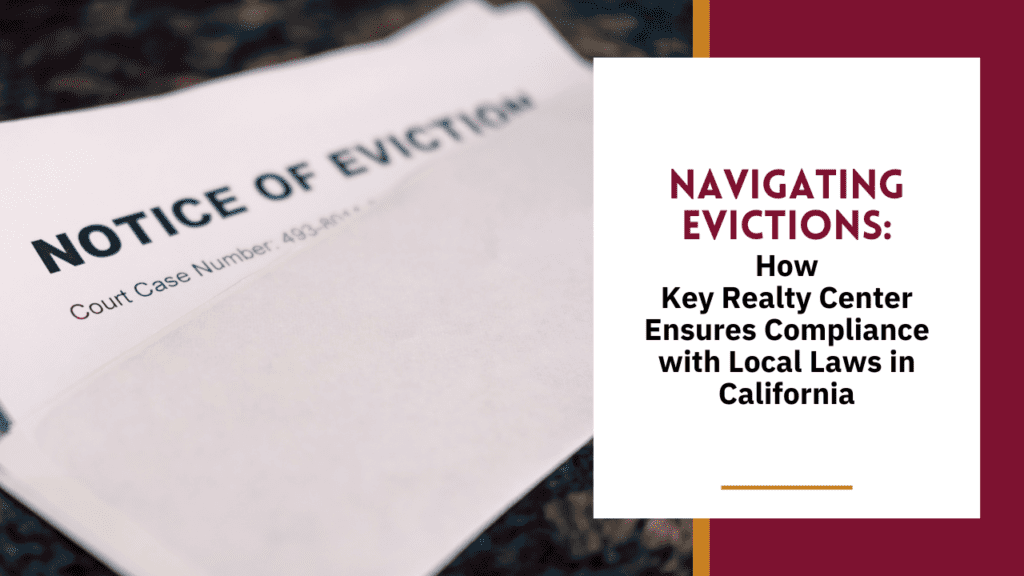
When was the last time you evicted a tenant from your rental property?
Hopefully, you’ve never had to do it. But if you have, you likely understand how stressful and time consuming this can be. It’s also expensive.
At Key Realty Center, evictions are rare. We are careful about screening our tenants and intentional about relationships and accountability. If we do have to evict, however, we understand the process and we know how to navigate the legal requirements.
A lot has changed since 2020 when it comes to evictions in California. If you’re not aware of the law and the consequences for even a minor misstep, you don’t want to go too far down the path of eviction without the help of a property manager or an attorney.
We stay up to date on California laws and regulations, so we’re well-versed in eviction procedures even though we work hard to avoid them. If you find yourself unable to collect rent from your tenant, unable to bring them into compliance after a lease violation, or you suspect the tenant is breaking the law or doing something illegal inside your property, get help from a local property manager or an attorney right away. Going straight to eviction, you could miss some important steps and make an expensive legal mistake.
Let’s talk about navigating evictions in California and how to get your property back without making your situation worse.
Just Cause Eviction Laws and Grounds for Removing a Tenant
California has just cause eviction laws, which means we need to have a legal reason to evict your tenant, otherwise you will be expected to pay them a relocation fee. The law allows us to evict under one of these common and at-fault situations:
- Nonpayment of Rent
This is certainly the most common reason for evicting a tenant. When your tenant stops paying rent, you have the right to terminate the lease and begin an eviction. There are steps to take before evicting them, however. First, serve the Notice to Pay or Vacate, and then move forward with the eviction filing at court if a tenant does not catch up and make the rental payment and also refuses to leave the property. To evict for nonpayment of rent, you’ll need a copy of your lease, where you indicate how much rent is due when it’s due, and how it’s to be paid. Prepare to provide copies of your ledger or financial records that show rent hasn’t been paid, and always retain copies of any tenant communication. Defaulting on rent will always be a good reason to evict a tenant.
- Not Vacating or Renewing the Lease
Let’s say your tenant has not renewed the lease agreement after the end of the tenancy but also has not given notice of their intent to move out. If a lease has ended after January 1, 2020, but your tenant refuses to renew or move, you can start eviction proceedings. There will be a notice period and a court filing, but typically this type of eviction resolves itself easily. The tenant will ultimately move out if they didn’t ever intend to renew the lease.
- Lease Violations
Have you noticed and documented a lease violation and your tenant has refused to come into compliance? If they won’t cure the problem even after you serve the required notices, you can evict them for failing to adhere to the lease and not complying with the written contract that was agreed upon and signed.
- Criminal Activity
Possibly the fastest eviction type which needs very little notice is criminal activity. If there is a criminal act committed on your property, either in the tenant’s private residence or in the communal areas of an apartment building, you can evict within days. Make sure you have evidence and can support your claim before you evict your tenant.
Keep in mind that retaliatory evictions are strictly prohibited in California. Don’t turn off the utilities just because the rent is two months late.
Notices Before Eviction
Before we file for eviction in court, we need to serve your tenants the proper notice. It’s an important part of the process, and the eviction will not be successful without evidence of the notice being served. Most evictions occur because of nonpayment of rent, and when we are approaching eviction for that reason, we will first send your tenants a Three Day Notice to Pay or Quit.
The notice will be addressed to the tenant by name or names, and it will clearly state what we want them to do. In the case of non-payment, our notice will instruct them to catch up with the rent that’s due within three days or move out of the property.
In our experience, tenants will catch up at this point because they won’t want the situation to escalate. They may ask if they can make a partial payment or pay a few days or a week from the date of the notice. We will discuss this with you if you want to be involved. Some owners are eager to get the tenant out while some owners prefer to keep the tenant in place and ultimately collect the payment. If we do agree to a payment arrangement, we will put it in writing and move forward with the eviction process if the tenant does not come through.
Our position is that it’s better to work with residents when we can. We will always still move forward with the eviction process because if they don’t come through or follow the terms of the payment arrangements, we will want to pick right up with the court date and the lease enforcement. But, we’re also prepared to call the eviction off when the rent does get paid. This is fair.
Filing the Unlawful Detainer Action
If the rent is not paid when it should be or the lease violation has not been cured, we file the unlawful detainer action in court. An unlawful detainer is the legal way of initiating a lawsuit that evicts the tenant from your property.
Something we always warn our owners about is the courts are backed up in California; they have been since the pandemic, and you can expect that things might still move a bit slower than you’d like. This is another excellent reason to avoid evictions when we can.
If the tenant responds within the number of days that are given for a response, a court hearing will be scheduled. In court, we will present your case for eviction and provide evidence supporting the ground for the eviction. The judge will hear both sides and make a decision based on the evidence presented. If the judge grants the eviction, the sheriff’s department will eventually serve a Writ of Possession, giving the tenant their final notice to move out.
Guidelines for Avoiding Evictions in California
We can expertly handle an eviction if it becomes necessary. We still believe in preventative measures, however. It’s better for you and it’s better for your property. Preventing evictions will save you time, money, and a lot of frustration. Eviction should be a last resort, always.
In our experience, it’s better to focus on these things before rushing to the courthouse.
- Solid Tenant Screening
Don’t rent to tenants who have a history of evictions. During the screening process, make sure you’re closely evaluating their rental history. Talk to former landlords if you can. Ask if rent was paid on time and if they took good care of the property. Always check for prior evictions. We invest a lot of time and resources into tenant screening because we know how essential it is, especially when it comes to preventing evictions.
- Lease Enforcement
We have a rent collection policy in place that prevents the late and missing rent payments that often lead to eviction. We always share our rent collection policy with tenants before they move in, and then we reinforce it throughout the tenancy. The lease agreement reflects all the consequences of paying rent late, including late fees and the potential for eviction.
- Tenant Relationships
We are less likely to have to evict a tenant with whom we have a positive and respectful relationship. To that end, we put every effort into working well with your residents. Eviction will be rare.
 Evicting a tenant is a challenging process for landlords, and following the proper procedures will make it fair and effective. It is advisable to have an experienced attorney who can guide you through the process and ensure that you comply with the provisions of the law. If you aren’t prepared to contact an attorney but you’d still like some professional help, get in touch with us at Key Realty Center. We can help you.
Evicting a tenant is a challenging process for landlords, and following the proper procedures will make it fair and effective. It is advisable to have an experienced attorney who can guide you through the process and ensure that you comply with the provisions of the law. If you aren’t prepared to contact an attorney but you’d still like some professional help, get in touch with us at Key Realty Center. We can help you.
By understanding the grounds for eviction, serving the notice properly, filing the unlawful detainer action, attending the court hearing, and following California law, we can ensure you’re conducting a fair and effective eviction in California.

 Broker-Owner Rod Luman has three decades of experience in the real estate industry. A lot has changed over the past three decades, but nothing has changed property management as much as computer technology. Today Key Realty Center uses cutting-edge tools to research market conditions and set rental prices, to thoroughly screen tenants, schedule and track maintenance, and provide extensive reporting for owners and tenants.
Broker-Owner Rod Luman has three decades of experience in the real estate industry. A lot has changed over the past three decades, but nothing has changed property management as much as computer technology. Today Key Realty Center uses cutting-edge tools to research market conditions and set rental prices, to thoroughly screen tenants, schedule and track maintenance, and provide extensive reporting for owners and tenants.